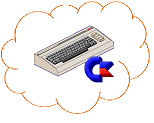Make sure the latch clamps the disk properly. Without a disk, move the lever down and see if the spring presses the collar against the spindle to clamp it securely. You can bend the tab down -slightly- (Newtronics drives only) so it makes more firm contact if necessary. A slipping or stalling disk will produce random read and write errors, a problem that's very hard to track down. Some disks may work better than others. The DD ones without a hub ring seem to slip more easily. HD disks should never be used in a 1541.
Bad (sticky) old grease on an ALPS drive can actually stall the spindle motor. If that is suspected, or the clamper is noisy, you can try a drop of oil in the center of the spindle clamper and run the drive to let the oil work its way in. If that doesn't help, you wiil have to remove the metal bar that the hub lock is mounted on (two screws in the back) and take apart the clamper assembly by removing the C clip. It has half a dozen assorted washers, a brass bushing and a spring along with the plastic hub. Don't allow
any of the spring-loaded parts to fly off when you remove the C clip. These parts need to be cleaned with solvent and put back together in the same order as before. A bit of moly lube or light oil finishes the job. Make sure the hub clamper is centered on the spindle (drive door closed) before you fully tighten the its screws.
Another common problem with the ALPS (push-down door) mechanism is a sticky latch. The symptom is usually that it will not pop out when the door is pressed down. The grease on the sides of the plastic latch gets sticky and makes the latch sluggish. A drop of oil on each side of the latch and "exercising" it to work the lube in will usually fix it. Be sure to wipe up any excess. You don't want oil on your disks!
If the Newtronics (twist door) mechanism stepper seems sticky after cleaning the rails, you can try adding a few drops of oil to its shaft by tipping the drive on its rear and applying the oil to the space between the stepper collar and the metal base. The oil will run down and collect on the shaft (without disassembly) and wick it's way into the bearing. The same thing can be done to quiet a noisy spindle, but I've had to take a few of those apart to replace a really noisy bearing. Don't overdo the oiling, and keep a rag handy to clean up the excess.
-- Ray Carlsen --

Comments